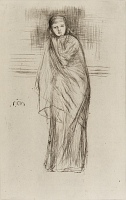Draped Model | ||
| Number: | 109 | |
| Date: | 1873/1874 | |
| Medium: | drypoint | |
| Size: | 210 x 135 mm | |
| Signed: | butterfly at left (4-final) | |
| Inscribed: | no | |
| Set/Publication: | 'Cancelled Plates', 1879 | |
| No. of States: | 11 | |
| Known impressions: | 35 | |
| Catalogues: | K.100; M.118; T.80; W.87 | |
| Impressions taken from this plate (35) | ||
STATE
Eleven states are known before cancellation, which occurred in two stages, and restoration of the plate.
State 1

There is no signature or inscription.
The composition is basically complete, but there are only four lines at left and one at right to represent the dado; there is a small patch of foul biting at the upper left corner.
State 2

Horizontal lines are added above the earlier lines of the dado on each side of the figure; new vertical lines cross the shading in the background to the right of her head.
State 3

New vertical lines extend the shading in the background to the right of the woman's shoulder; new lines strengthen the folds on the robe, and it is slightly widened at the hemline at left.
State 4

Signed with a butterfly at left, halfway up the plate.
There are more vertical lines in the background on both sides of the figure, two of which nearly reach the dado at right.
State 5

Vertical shading is added above both sides of the figure's head and to left of her shoulders; four horizontal lines are added above the dado at left.
State 6

The vertical shading on the background is extended above and below the dado at left.
State 7

Some shading to left of the figure and on the left side of her robe is partly removed; the small patch of foul biting at upper left is almost completely removed.
State 8

The outlines of the left side of the robe are redrawn; close vertical shading now reaches the figure's right shoulder and extends to the top of the dado; vertical shading to right of the butterfly signature is redrawn or strengthened.
State 9

Two curving right to left diagonal lines (//) are added to the drapery over the figure's right arm, at the same height as the dado.
State 10

Many strong horizontal lines are added on both sides of the figure.
State 11

Vertical lines extend and reinforce the shading in the background at left, above the butterfly.
In later impressions, like the one reproduced above, there is evidence of pitting on the upper portion of the plate as well as a diagonal scratch on either side of the figure. The impression illustrated also has a series of small brown ink dots to right of the robe, near the knees. The example illustrated by Kennedy shows much less surface damage 7 , and another impression has just one diagonal scratch, to left of the figure.
7: Kennedy 1910[more] (cat. no. 100).
State 11 (cancelled a)

The plate is lightly cancelled with crossed diagonal lines at the top of the figure's head, very faint left and right diagonals on her face, one right to left diagonal (/) to left of her head, two more across her torso and three slightly left to right diagonals (\\) to right of her hip; many short scratches are visible, most notably below the butterfly at left and above and below the dado at right.
Published in the set of Cancelled Plates by the Fine Art Society in 1879.
State 11 (cancelled b)
Not reproduced ().
A slightly curved diagonal line is added to left of the right to left diagonal to left of the figure's head.
State 11 (after cancellation)

Close vertical shading is added to left of the figure's torso, and close horizontal shading is added above her head, on either side of the skirt of her robe and at the lower right corner; diagonal shading is added below the butterfly at left; some outlines may have been strengthened.
The new vertical, horizontal and diagonal shading appears to have been scraped into the plate with a dull point rather than drawn with a drypoint needle; cancellation lines remain but are barely visible.
